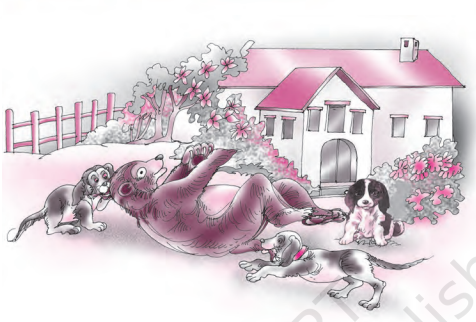The Bear Story – Part (i)
THERE was once a lady who lived in an old manor-house on the border of a big forest. This lady had a pet bear she was very fond of. It had been found in the forest, half dead of hunger, so small and helpless that it had to be brought up on the bottle by the lady and the old cook. This was several years ago and now it had grown up to a big bear, so big and strong that he could have slain a cow and carried it away between his two paws if he had wanted to. But he did not want to; he was a most amiable bear who did not dream of harming anybody, man or beast.
He used to sit outside his kennel and look with his small intelligent eyes most amicably at the cattle grazing in the field nearby. The three shaggy mountain ponies in the stable knew him well and did not mind in the least when he shuffled into the stable with his mistress. The children used to ride on his back and had more than once been found asleep in his kennel between his two paws. The three dogs loved to play all sorts of games with him, pull his ears and his stump of a tail and tease him in every way, but he did not mind it in the least. He had never tasted meat; he ate the same food as the dogs and often out of the same plate—bread, porridge, potato, cabbage, turnip. He had a fine appetite, and his friend, the cook, saw to it that he got his fill. Bears are vegetarians if they have a chance, and fruit is what they like best. In the autumn he used to sit and look with wistful eyes at the ripening apples in the orchard, and in his young days he had been sometimes unable to resist the temptation to climb the tree and help himself to a handful of them. Bears look clumsy and slow in their movements, but try a bear with an apple tree and you will soon find out that he can easily beat any school boy at that game. Now he had learnt that it was against the law, but he kept his small eyes wide open for any apples that fell to the ground. There had also been some difficulties about the beehives; he had been punished for this by being put on the chain for two days with a bleeding nose and he had never done it again. Otherwise he was never put on the chain except for the night and quite rightly so, for a bear, like a dog, is apt to get somewhat ill-tempered if kept on the chain, and no wonder.
(To be continued………………)
